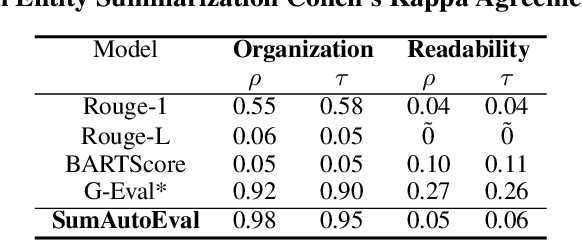Gautam Naik
Evaluate Summarization in Fine-Granularity: Auto Evaluation with LLM
Dec 27, 2024


Abstract:Due to the exponential growth of information and the need for efficient information consumption the task of summarization has gained paramount importance. Evaluating summarization accurately and objectively presents significant challenges, particularly when dealing with long and unstructured texts rich in content. Existing methods, such as ROUGE (Lin, 2004) and embedding similarities, often yield scores that have low correlation with human judgements and are also not intuitively understandable, making it difficult to gauge the true quality of the summaries. LLMs can mimic human in giving subjective reviews but subjective scores are hard to interpret and justify. They can be easily manipulated by altering the models and the tones of the prompts. In this paper, we introduce a novel evaluation methodology and tooling designed to address these challenges, providing a more comprehensive, accurate and interpretable assessment of summarization outputs. Our method (SumAutoEval) proposes and evaluates metrics at varying granularity levels, giving objective scores on 4 key dimensions such as completeness, correctness, Alignment and readability. We empirically demonstrate, that SumAutoEval enhances the understanding of output quality with better human correlation.
A Continued Pretrained LLM Approach for Automatic Medical Note Generation
Mar 14, 2024



Abstract:LLMs are revolutionizing NLP tasks. However, the most powerful LLM, like GPT-4, is too costly for most domain-specific scenarios. We present the first continuously trained 13B Llama2-based LLM that is purpose-built for medical conversations and measured on automated scribing. Our results show that our model outperforms GPT-4 in PubMedQA with 76.6\% accuracy and matches its performance in summarizing medical conversations into SOAP notes. Notably, our model exceeds GPT-4 in capturing a higher number of correct medical concepts and outperforms human scribes with higher correctness and completeness.
 Add to Chrome
Add to Chrome Add to Firefox
Add to Firefox Add to Edge
Add to Edge